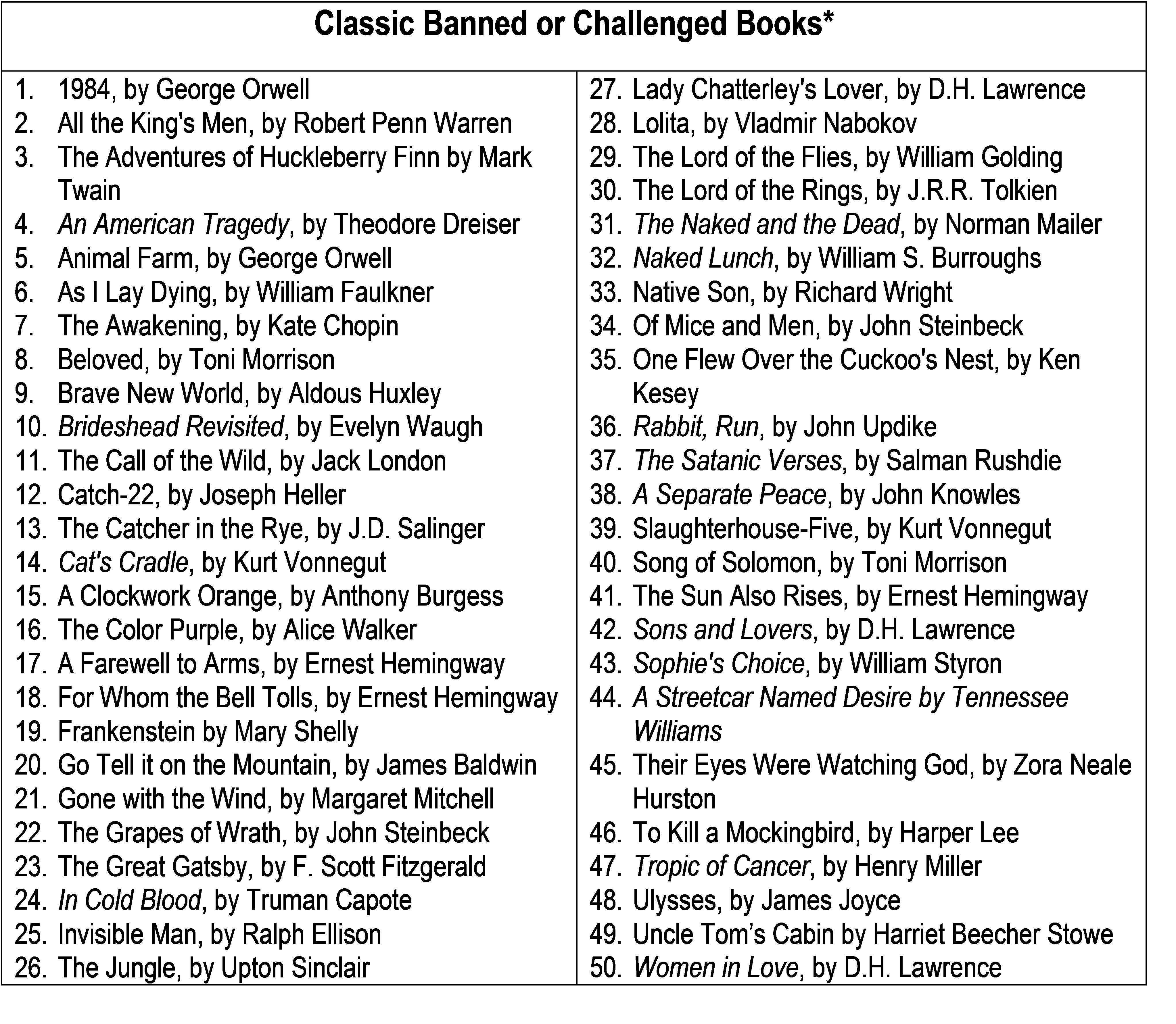By James Karney
“Give me the liberty to know, to utter, and to argue freely according to conscience, above all liberties.” – John Milton in Areopagitica, 1644
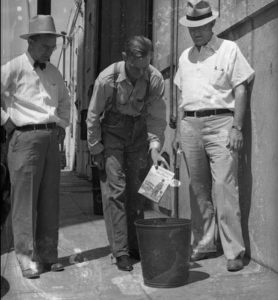
In the 1930’s farmers and businessmen in California’s San Joaquin Valley burned copies of John Steinbeck’s The Grapes of Wrath as, “obscene in the extreme”. Local officials were motivated by fears that it would insight the migrant “Okies” to unionize. The ban remained in place until 1941.
Franklin Roosevelt in his 1941 State of Union message to Congress put forth the concept of the four essential human freedoms – Freedom of Speech, Freedom of Worship, Freedom from Want and Freedom from Fear – that should be defended and protected. Roosevelt was preparing the country for the time when America and her sons would be called into the war which had been raging in Europe for the past 16 months.
Six years of world conflict and an estimated 70-85 million military and civilian deaths would free countless souls from Nazi and Japanese tyranny. But as history has shown, the four freedoms are still but a dream for many parts of the world. Roosevelt’s vision of, “a world founded upon four essential human freedoms” has yet to be achieved.
Challenges to freedom of speech still persist. The book burners of Nazi Germany are now the ISIS militants in Iraq and Syria, justifying their destruction of libraries and historical sites as cleansing the world of “inferior ideas,” just as the Nazis did. Justification for book banning, censorship or restriction of access to books is typically based upon moral, political, philosophical or religious grounds.
At its basis though, the banning of books is done out of fear:
- Fear that society will be corrupted by the words or ideas of an author,
- Fear that one’s religious beliefs are being blasphemed,
- Fear that a country’s political or economic ideology cannot hold up to differing ideas,
- Fear that ideas in a book may be inappropriate for children or teens.
It is our responsibility as citizens to uphold the values in our constitution and first among these are those freedoms found in the First Amendment – religion, speech, press, assembly and petition of grievances. The banning or censorship of books and the ideas contained therein should be an anathema to all those who believe in the principles upon which our country was founded.
 To live in a free society is to live in a society where people of differing political, religious, cultural or social backgrounds live in community. There should be open discourse and the sharing of ideas without threat of retribution or criticism. No one is asking for acceptance or approval of the ideas or beliefs with which you do not agree, just the right to freely express them.
To live in a free society is to live in a society where people of differing political, religious, cultural or social backgrounds live in community. There should be open discourse and the sharing of ideas without threat of retribution or criticism. No one is asking for acceptance or approval of the ideas or beliefs with which you do not agree, just the right to freely express them.
It is the responsibility of a parent to decide when and if a book is appropriate for his or her child. Limiting access to books in curriculum or school and public libraries impacts the freedom of others to raise their children under their own value and belief system. Most school districts have policies that allow parents to have their child read a different text when they feel a book in the curriculum is not appropriate for their child. This scenario took place last year in the Highland Park school district near Dallas. A small group of parents objected to seven books included in the English curriculum at the high school. The school board initially acquiesced to the request temporarily removing the books for review. Public outcry and the results of the review led to the books being reinstated.
This week celebrate your freedom, read a book that has been banned, censored or otherwise restricted.
 * These are not all- inclusive lists of banned or challenged books, visit the website of the Office for Intellectual freedom of the American Library Association for more complete lists,www.ala.org/bbooks/frequentlychallengedbooks.
* These are not all- inclusive lists of banned or challenged books, visit the website of the Office for Intellectual freedom of the American Library Association for more complete lists,www.ala.org/bbooks/frequentlychallengedbooks.
 This Act Locally Waco blog post is by James Karney. James worked in a library beginning in his sophomore year of high school and after a more than thirty year library career recently retired as Director of the Waco-McLennan County Library. He’s currently taking a sabbatical working on projects around the house, catching up on reading and doing research on Texas statesman Coke Stevenson. He has been married to the super amazing and talented Anita Karney for 20 years and their son Jamie is a senior at Midway High School.
This Act Locally Waco blog post is by James Karney. James worked in a library beginning in his sophomore year of high school and after a more than thirty year library career recently retired as Director of the Waco-McLennan County Library. He’s currently taking a sabbatical working on projects around the house, catching up on reading and doing research on Texas statesman Coke Stevenson. He has been married to the super amazing and talented Anita Karney for 20 years and their son Jamie is a senior at Midway High School.
If you would like to write a post for the Act Locally Waco blog, please contact Ashley Thornton by email at ashleyt@actlocallywaco.org .
By James Karney
Let’s go!
Batter up!
We’re tak-ing the af-ter-noon off!
It’s a beau-ti-ful day for a ball game, for a ball game to-day
The fans are out to get a ticket or two
From Wal-la, Wash-ing-ton to Kal-a-ma-zoo
– It’s A Beautiful Day For A Ball Game by Harry Simone
Spring is here and baseball opening day pitches are being thrown out from the Big Leagues to Little League.
In the Waco area hundreds of youth participate in Little League Baseball and Softball learning playing skills, teamwork, sportsmanship and character. I’d like to share with you about a division of Little League you probably did not know existed.
Challenger Little League provides the opportunity for children with physical, intellectual and developmental disabilities to play Little League baseball. During the April and May season, 125 area children play on a specially outfitted field with solid surface base paths at the Lake Air Fields with dedicated coaches and buddies guiding them. No matter the ability or skill level, “everyone plays!”
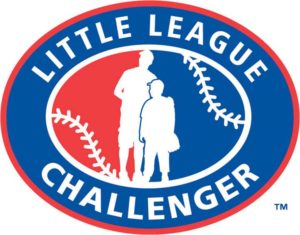 This year Challenger Little League in Waco celebrates its 25th season with children and teens from age 5 to 18 playing on ten teams. Challenger baseball came to Waco in 1990 as one of the first locations in Texas with 34 children participating that year.
This year Challenger Little League in Waco celebrates its 25th season with children and teens from age 5 to 18 playing on ten teams. Challenger baseball came to Waco in 1990 as one of the first locations in Texas with 34 children participating that year.
The kids have a great time just being kids playing ball and for parents it’s a little bit of normalcy just sitting in the bleachers with other parents watching their children play Little League baseball like any other parent.
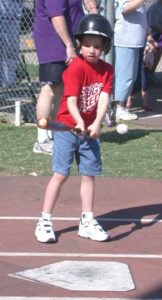 My son Jamie has played in Challenger since 2004 and I’ve been a coach since 2009. It’s been a great experience for both of us. When Jamie first played he’d hit the ball, run down to first base and then keep running straight down the right field line all the way to the outfield fence. Over the years his skill level has increased and he now hits a pretty mean line drive. I look forward to April and May, getting out my glove from high school and playing with the kids.
My son Jamie has played in Challenger since 2004 and I’ve been a coach since 2009. It’s been a great experience for both of us. When Jamie first played he’d hit the ball, run down to first base and then keep running straight down the right field line all the way to the outfield fence. Over the years his skill level has increased and he now hits a pretty mean line drive. I look forward to April and May, getting out my glove from high school and playing with the kids.
Challenger would not be possible without dedicated volunteers who manage league operations, coach, serve as buddies or team and league sponsors. Lupe Rosas, Don Deatherage and Michelle McCollum have worked with Waco’s Challenger League from its beginnings in 1990. Others like Coleen Ostrom and Pepper Jones make things run smoothly every year arranging for uniforms, volunteer buddies, fundraisers and more. Each of the ten Challenger teams has two or three coaches. Many of the coaches, like in other Little League divisions, are parents who want to share their love of baseball and sports with their son or daughter.
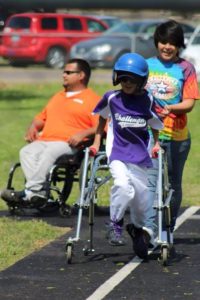 At every game you will also find buddies for the players. Buddies play a vital role in the game by being paired up with a player to provide them assistance they might need from pushing a wheel chair, putting on a batting helmet, keeping them focused on the game (and not watching airplanes flying overhead.) and most importantly encouragement.
At every game you will also find buddies for the players. Buddies play a vital role in the game by being paired up with a player to provide them assistance they might need from pushing a wheel chair, putting on a batting helmet, keeping them focused on the game (and not watching airplanes flying overhead.) and most importantly encouragement.
Some buddies volunteer for the season while others come out for a game or two. These buddies are frequently from other Little League teams or high school baseball and softball teams. Last season members of the Baylor Lady Bear’s Softball team were buddies at one of our games. The buddies also allow parents a period of respite to sit in the stands, visit with other parents and cheer on their little sluggers.
Team sponsors are another part that makes Challenger Little League possible by providing funding to help underwrite costs. For the 2015 season team sponsors are:
 The Don Deatherage Challenger Field is located near the City of Waco’s Cobbs Recycling Center by Lake Air Fields 4 & 5. Games are played Tuesday and Thursday evenings at 6pm and 7pm and on Saturday morning’s beginning at 9am. Opening day games are this Saturday, April 18. (Facebook: Challenger Little League in Waco.)
The Don Deatherage Challenger Field is located near the City of Waco’s Cobbs Recycling Center by Lake Air Fields 4 & 5. Games are played Tuesday and Thursday evenings at 6pm and 7pm and on Saturday morning’s beginning at 9am. Opening day games are this Saturday, April 18. (Facebook: Challenger Little League in Waco.)
Come on out some evening or Saturday morning and cheer on these great athletes!
 This Act Locally Waco blog post is by James Karney. James worked in a library beginning in his sophomore year of high school and after a more than thirty year library career recently retired as Director of the Waco-McLennan County Library. He’s currently taking a sabbatical working on projects around the house, catching up on reading and doing research on Texas statesman Coke Stevenson. He has been married to the super amazing and talented Anita Karney for 20 years and their son Jamie is a junior at Midway High School.
This Act Locally Waco blog post is by James Karney. James worked in a library beginning in his sophomore year of high school and after a more than thirty year library career recently retired as Director of the Waco-McLennan County Library. He’s currently taking a sabbatical working on projects around the house, catching up on reading and doing research on Texas statesman Coke Stevenson. He has been married to the super amazing and talented Anita Karney for 20 years and their son Jamie is a junior at Midway High School.
If you would like to write a post for the Act Locally Waco blog, please contact Ashley Thornton by email at ashleyt@actlocallywaco.org .
by James Karney
When I was a little boy in Bristol, Connecticut, one of my favorite toys was a well-worn set of Lincoln Logs that belonged to my older brothers. I would spend hours building cabins and forts out of the pieces; I can still feel the smooth texture of the logs and green roof slats in my hands. I’d play with the plastic frontiersman and animals creating stories and dialog; occasionally a GI Joe would make an appearance too. Those are great childhood memories, but what do building toys like Lincoln Logs and Legos and blocks have to do with the library?
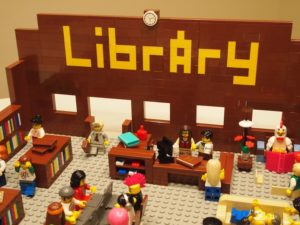 One role of the public library is to be a preschooler’s door to learning. As you already know, the library is a place children visit with parents and caregivers to be introduced to books and to begin to develop a love of reading, and learning. Library programs such as storytime help to develop school readiness skills such as listening, paying attention, following directions, and playing with other children. This, like many of the other programs and services of the library, folds into the one of the eight assumptions, of the Greater Waco Education Alliance. Participating in library storytime specifically addresses the first assumption, “Develop learning readiness and social skills before entering school (ages 0–4).” Storytimes for children are a staple of public libraries. At the Waco-McLennan County Library early childhood programming walks with children and parents from infancy with “Baby Time,” to “Toddle Time,” and then to “Pre-School Storytime.” (By the way, after a busy summer, Miss Vivian and Miss Stacy are taking a breather in August. Storytimes will resume the week of September 9th. )
One role of the public library is to be a preschooler’s door to learning. As you already know, the library is a place children visit with parents and caregivers to be introduced to books and to begin to develop a love of reading, and learning. Library programs such as storytime help to develop school readiness skills such as listening, paying attention, following directions, and playing with other children. This, like many of the other programs and services of the library, folds into the one of the eight assumptions, of the Greater Waco Education Alliance. Participating in library storytime specifically addresses the first assumption, “Develop learning readiness and social skills before entering school (ages 0–4).” Storytimes for children are a staple of public libraries. At the Waco-McLennan County Library early childhood programming walks with children and parents from infancy with “Baby Time,” to “Toddle Time,” and then to “Pre-School Storytime.” (By the way, after a busy summer, Miss Vivian and Miss Stacy are taking a breather in August. Storytimes will resume the week of September 9th. )
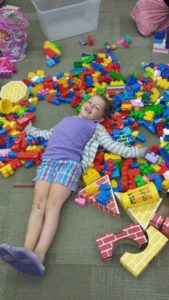 Storytime is certainly an important stepping stone on the path to a love of learning, but at the library we recognize it is not the only stone in the path. In addition to weekly storytimes, the library offers other programming for children. Two programs we started last year have developed loyal and nearly overwhelming followings: a monthly “Lego Lab” for children 6-12, and a “Block Party” for Toddlers and Pre-K. Playing with blocks helps children develop motor, spatial, social and language skills and creative play. These skills are pretty obvious to anyone who has ever watched a toddler play and stack wooden blocks.
Storytime is certainly an important stepping stone on the path to a love of learning, but at the library we recognize it is not the only stone in the path. In addition to weekly storytimes, the library offers other programming for children. Two programs we started last year have developed loyal and nearly overwhelming followings: a monthly “Lego Lab” for children 6-12, and a “Block Party” for Toddlers and Pre-K. Playing with blocks helps children develop motor, spatial, social and language skills and creative play. These skills are pretty obvious to anyone who has ever watched a toddler play and stack wooden blocks.
Not so obvious are the long-term science, math and problem solving skills being developed. These skills support the third assumption of the Education Alliance, “Master math concepts (ages 9 to 17).” The research makes this connection plain:
• A longitudinal study by Wolfgang, Stannard and Jones found that beginning in the middle school years and onward through high school that there was a positive correlation between pre-school block play and mathematical achievement. (Journal of Research in Childhood Education, v15 n2 p173-80 Spring-Summer 2001)
• A 2009 article by Sarama and Clements explores the benefits of block and Lego play. (American Journal of Play p313-337 Winter 2009). At younger ages, pattern recognition, colors, shapes and counting are central to block and Lego play and with age come more complex skill development.
• For the differently abled, a 2006 study found that therapeutic play using Legos has a positive impact on social skill development of autistic children. (Autism, v10, n4 p317-29 July 2006).
In addition to the STEM (Science, Technology, Engineering and Math) benefits of block and Lego play, there are also language, literacy and social skills being developed. In group play with other children, a child learns about sharing and turn taking.
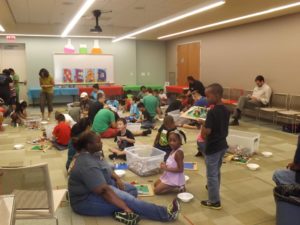 Playing with blocks is a terrific way for parents to bond with their children and to act on their role as a child’s first teacher. Children get the most benefit from block play when parents and caregivers get on the floor and play alongside their children taking the opportunity to teach colors and counting, to compare block sizes and shapes, and perhaps most important of all, to share vocabulary with the child. Vocabulary development is a key to learning to read. The more children are exposed to new and different words, the more success they will have in learning to read and developing their reading skills. One of the best investments you can make in your child’s education is to spend time with them whether it is reading books, playing with Legos, or just talking with them. Hart and Risley found children’s academic successes at ages nine and ten are attributable to the amount of talk they hear from birth to age three. Meaningful Differences in the Everyday Experience of Young American Children. (Brookes Publishing 1995).
Playing with blocks is a terrific way for parents to bond with their children and to act on their role as a child’s first teacher. Children get the most benefit from block play when parents and caregivers get on the floor and play alongside their children taking the opportunity to teach colors and counting, to compare block sizes and shapes, and perhaps most important of all, to share vocabulary with the child. Vocabulary development is a key to learning to read. The more children are exposed to new and different words, the more success they will have in learning to read and developing their reading skills. One of the best investments you can make in your child’s education is to spend time with them whether it is reading books, playing with Legos, or just talking with them. Hart and Risley found children’s academic successes at ages nine and ten are attributable to the amount of talk they hear from birth to age three. Meaningful Differences in the Everyday Experience of Young American Children. (Brookes Publishing 1995).
The Library’s Lego Lab (Saturday) for children and toddler/Pre-K Block Party (Sunday) using Legos and blocks are held monthly. For days and times and to reserve a space for your child, visit the library’s online events calendar. The name Lego comes from the Danish phrase leg godt, which means “play well”, so come play well at the library and continue to Read, Waco, Read!
 This Act Locally Waco blog post is by James Karney. James has worked in a library since his sophomore year in high school and is the Director of the Waco-McLennan County Library. He enjoys reading biographies, history, and spy/espionage novels. He has been married to the super amazing and talented Anita Karney for 20 years, and their son Jamie will start his junior year of high school this year – yikes! Visit the Library’s website, www.wacolibrary.org to explore all of our services, program and resources and “Like Us” on Facebook at, www.facebook.com/WacoLibrary.
This Act Locally Waco blog post is by James Karney. James has worked in a library since his sophomore year in high school and is the Director of the Waco-McLennan County Library. He enjoys reading biographies, history, and spy/espionage novels. He has been married to the super amazing and talented Anita Karney for 20 years, and their son Jamie will start his junior year of high school this year – yikes! Visit the Library’s website, www.wacolibrary.org to explore all of our services, program and resources and “Like Us” on Facebook at, www.facebook.com/WacoLibrary.
If you would like to write a post for the Act Locally Waco blog, please contact Ashley Thornton by email at ashleyt@actlocallywaco.org .
By James Karney, Director of the Waco-McLennan County Library
The end of the school year is in sight. Summer is upon us: a time of lemonade, vacation trips, summer camps, and sleeping late. But for far too many children and teens, it’s also a time when they close up their books and do not read.
I’d like to challenge the people of Waco this summer to Read, Waco, Read!
- Read for fun or read for information.
- Read a book, read a magazine, read a newspaper. As long as the topic interests you, you’ll enjoy it.
- Just as exercise keeps your body physically fit, reading keeps your mind mentally fit.
- Parents, grandparents, aunts, uncles, older siblings, caregivers – you have a special charge, read to be an example to the children in your life. If they see you reading, you may find them reading.
A number of academic studies over the past 35 years have found that children who participate in summer reading programs maintain their reading skills, need less reinstruction at the beginning of the school year and perform at a higher level on standardized tests compared to students who do not participate in summer reading programs. In a recent Op-Ed in the New York Times, Frank Bruni lamented the increasing number of children and teenagers who never read for pleasure – currently 22% of 13 year-olds up from 8% of 13 year-olds just twenty years ago.
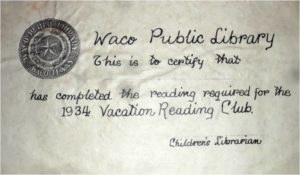 Reading is the key skill that everyone needs to function in society. Reading gives you the ability to communicate, learn, and grow – regardless of your age. For children, it is most important for them to develop the skill and habit of regular reading that they will need for secondary school, post-secondary education and to become lifelong learners and readers.
Reading is the key skill that everyone needs to function in society. Reading gives you the ability to communicate, learn, and grow – regardless of your age. For children, it is most important for them to develop the skill and habit of regular reading that they will need for secondary school, post-secondary education and to become lifelong learners and readers.
For nearly 90 years the Waco library has offered a summer reading program for children and in 2014 the Waco-McLennan County Library will offer summer reading clubs for all ages.
- Fizz Boom READ! for children
- Spark a Reaction for teens and tweens
- Literary Elements for adults.
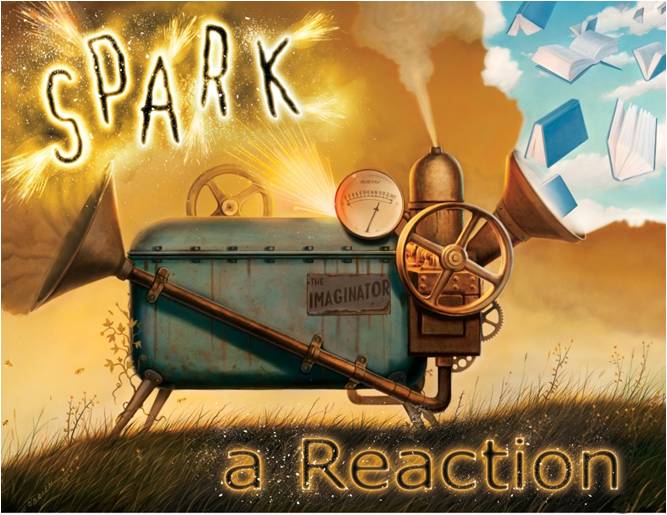 The Children’s and Teen/Tween clubs have a science theme that fits into the emphasis being placed on STEM education in schools. Many of the summer programs and activities planned for these age groups have a science or technology component. To learn more about our summer programs visit the library’s website at, www.wacolibrary.org
The Children’s and Teen/Tween clubs have a science theme that fits into the emphasis being placed on STEM education in schools. Many of the summer programs and activities planned for these age groups have a science or technology component. To learn more about our summer programs visit the library’s website at, www.wacolibrary.org
Sign-up for summer reading clubs begins at all libraries on Monday, June 2, and on Saturday, June 7 the Library will host a Family Fun Day from 1-4pm at the Central Library, 1717 Austin Ave. to kick-off our summer programs. Zooniversity will present a live animal program at 1:30pm and there will be fun for all ages including science experiment stations in the courtyard, teens constructing a 5 foot tall paper rollercoaster, snow cones, crafts and face painting.
 During June and July, support from the Friends of the Library helps provide for weekly Summer Showcase programming programs featuring guest performers at each library:
During June and July, support from the Friends of the Library helps provide for weekly Summer Showcase programming programs featuring guest performers at each library:
- Tuesday, East Waco at 9:30am and 10:30am
- Wednesday, West Waco at 10:30am and 1:30pm
- Thursday, Central at 10:30am and 1:30pm
- Friday, South Waco at 10:30am and 1:30pm
Family Night programming allows children and parents to attend summer showcase programming in the evening:
- Central Library – Tuesdays, June 17, 24 and July 1 at 7pm
- West Waco Library – Thursdays, July 10, 17, 24 and 31 at 7pm
The Angel Paws Reading Buddies program returns for another summer and allows children to practice their reading skills by reading to a furry, four-legged friend. These specially trained animal therapy dogs are great listeners who provide encouragement to reluctant and struggling readers while boosting their self-esteem during a 20 minute reading/craft session. Angel Paws will be at the Central Library on Monday evenings from 6:30-8pm and Wednesday mornings from 10:30am-12:30pm. Contact Vivian Rutherford at 254-750-5952 to schedule a 20 minute session.
For teens and tweens, programs will take place on Tuesday afternoons and Saturday afternoons and will include a variety of hands on science and craft programs. And zombies too!
This past week saw the passing of author and poet Maya Angelou. Of her many, many notable quotes, perhaps my favorite relating to libraries was one during a college commencement address while exhorting the graduates to read voraciously and to never stop learning she stated, “My encouragement to you is to go tomorrow to the library.“
This summer come to the library and – Read, Waco, Read!
 This Act Locally Waco blog post is by James Karney. James has worked in a library since his sophomore year in high school and is the Director of the Waco-McLennan County Library. He enjoys reading biographies, history, and spy/espionage novels. He has been married to the super amazing and talented Anita Karney for 20 years and their son Jamie will complete his sophomore year of high school on Friday – yikes!
This Act Locally Waco blog post is by James Karney. James has worked in a library since his sophomore year in high school and is the Director of the Waco-McLennan County Library. He enjoys reading biographies, history, and spy/espionage novels. He has been married to the super amazing and talented Anita Karney for 20 years and their son Jamie will complete his sophomore year of high school on Friday – yikes!
If you would like to write a post for the Act Locally Waco blog, please contact Ashley Thornton by email at ashleyt@actlocallywaco.org .

